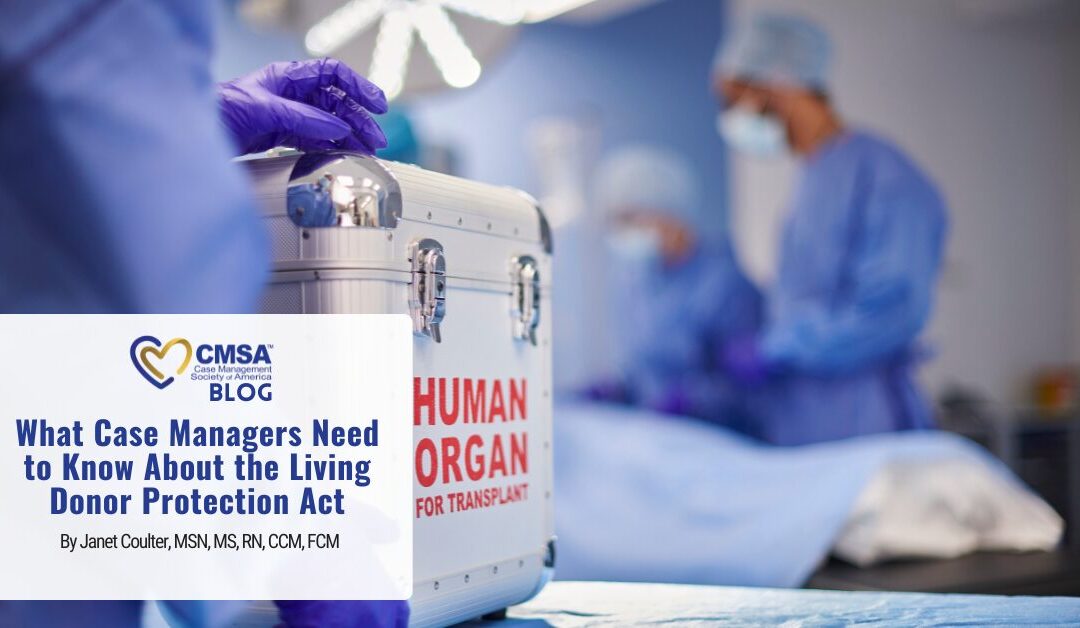By Janet Coulter, MSN, MS, RN, CCM, FCM
When someone steps forward to donate a kidney or part of their liver, they are doing more than donating an organ or part of an organ. They are offering another person a second chance to live. It is an extraordinary act of generosity. But what many people do not realize is that living organ donors often face unexpected challenges, including insurance discrimination and lack of job protection. In fact, studies show that 1 in 4 living donors have reported issues accessing life, disability, or long-term care insurance after their donation (American Journal of Transplantation, 2021).
As case managers, we are in a unique position to guide and advocate for living organ donors. That is why it is so important to be aware of the Living Donor Protection Act, a newly reintroduced bill in Congress. This bill could help remove key barriers for living organ donors.
In July 2025, Representatives Jerrold Nadler (D-NY) and Don Bacon (R-NE) introduced the Living Donor Protection Act in the House (H.R. 4583 and H.R. 4582). This is a bipartisaneffort. It has support from both major political parties and has been introduced in both the House and the Senate. Senators Kirsten Gillibrand (D-NY) and Tom Cotton (R-AR) brought the bill forward in the Senate.
The legislation focuses on three major protections for living donors:
- Non-Discrimination
Insurance companies would be prohibited from denying coverage, limiting benefits, or increasing premiums just because someone is a living donor. This includes life, disability, and long-term care insurance. - Job-Protected Medical Leave
The bill amends the Family and Medical Leave Act (FMLA) to ensure living donors can take time off work to recover from surgery whether they work in the private sector or federal employment. - Updated Public Education
The Department of Health and Human Services (HHS) will be required to update its materials to better inform the public and potential donors about these new protections.
Many potential living donors hesitate once they learn about the possible risks to their job security or insurance coverage. These fears can stop them from moving forward, even when they are willing to help save a life. This bill is designed to remove those fears.
As professional case managers who coordinate transplant care or support patients waiting for a transplant, we can help educate, reassure, and advocate especially when new laws make it easier to say “yes” to donation.
“We must work together to increase living organ donation, and the Living Donor Protection Act provides a tangible path forward by removing key barriers for those willing to give the gift of life.”
American Liver Foundation, 2025
Case managers will play a vital role in translating this legislation into real-world support. Here is what we can do:
- Stay Informed: Follow updates on the bill’s progress through Congress, including committee hearings and votes. You can track H.R. 4583 and H.R. 4582 at congress.gov.
- Engage Employers and Insurers: Be prepared to answer questions or advocate when patients or donors face outdated or discriminatory policies.
- Use Updated Materials: Once HHS releases new educational resources, incorporate them into patient education and donor conversations.
- Share the News: Proactively inform donor candidates about their rights and protections. Reducing misinformation helps increase donor retention and confidence.
The Living Donor Protection Act marks a major step toward honoring and safeguarding those who give the ultimate gift. For case managers, this is not just legislation. It is a call to action. It is a chance to remove barriers, reassure donors, and ensure that generosity is met with protection and respect.
For professional case managers, this legislation is a vital tool in reducing barriers to living donation, supporting informed decision-making, and advocating for equitable care. By staying engaged in the legislative process and educating both potential living donors and stakeholders, case managers play a critical role in ensuring that the gift of life is respected, supported, and protected. Together, with professional support and policy change, we stand to increase donation rates and save lives one conversation, one donor, one case at a time.
References:
- American Journal of Transplantation. (2021). Insurance-related challenges for living organ donors. https://doi.org/10.1111/ajt.16592
- U.S. Congress. (2025). H.R.4583 – Living Donor Protection Act of 2025. https://www.congress.gov/bill/118th-congress/house-bill/4583
- American Liver Foundation. (2025). Living Donor Protection Act Press Release
CMSA Members to save $35 on registration for our highly anticipated Virtual Leadership Conference!
Join your peers for a dynamic live Zoom event on Saturday, October 11, 2025, from 10 a.m. - 5 p.m. Eastern. This conference is designed to equip you with the skills and knowledge to lead with impact.
Register now at: https://cmsa.org/virtual-leadership-conference-2025/
Bio: Janet Coulter, MSN, MS, RN, CCM, FCM is President of CMSA. She is a transplant case manager with a wide variety of experiences including educator, administrator, team leader, and Director of Case Management. Janet holds a Master of Science in Nursing from West Virginia University and a Master of Science in Adult Education from Marshall University. She has published many articles in CMSA Today and the Professional Case Management Journal and served as a reviewer for the Core Curriculum for Case Management Third Edition. She has served as President-Elect of CMSA, Chair of the CMSA Today Editorial Board, Chair of the Nominations Committee, and Vice-President of the CMSA Foundation board. Janet was the recipient of the CMSA National Award of Service Excellence and Southern Ohio Valley CMSA Case Management Leadership award and was recently inducted as a Case Management Fellow from CMSA.

